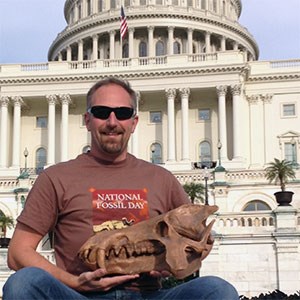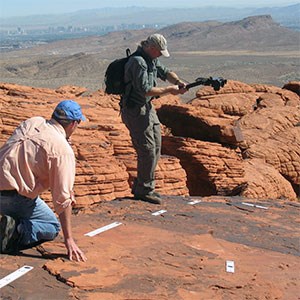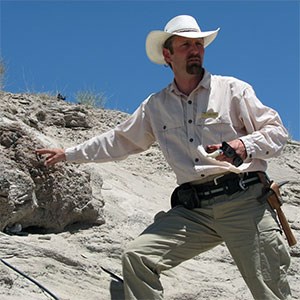Part of a series of articles titled Meet A Paleontologist.
Article
Scott Foss, Bureau of Land Management

BLM Senior Paleontologist, U.S. Department of the Interior, Bureau of Land Management (BLM)
What is your job, and what do you study?
I am the senior paleontologist for the Bureau of Land Management and am in charge of developing and implementing policy for managing paleontological resources using scientific principles and expertise.
My area of study is the evolution of early mammal groups, including entelodonts, a pig-like animal that lived from 40 – 17 million years ago.

What are you working on now?
At BLM we are working to implement the Paleontological Resources Preservation Act and coordinate bureau policy with other Federal agencies. We are also promoting some of our recent successes, including the discoveries of multiple new dinosaur species across the American West.
In my study I collaborate with numerous researchers to look at the evolutionary origin of two-toed ungulates, one of which may have given rise to modern whales. Most of this research is done outside of the office and many of the fossils we are investigating are in Europe, Africa, and Asia.

Where did you go to school? What were some of your favorite classes that you took?
I completed an undergraduate degree in geology with a minor in biological sciences. I later finished the education for a second major in biology and took courses in veterinary anatomy. My graduate work was in biological sciences with an emphasis in paleontology and evolution. From my education I consider myself to be a paleobiologist.
During graduate school I worked for Badlands National Park, first as an intern and later as a seasonal paleontologist. I finished my Ph.D. while working at John Day Fossil Beds NM. Having one foot in academia and another in public land management directed me to my current career.
Was there an experience you had that made you realize you wanted to be a paleontologist?
When I was very young my grandmother patiently explained to me the difference between dragons and dinosaurs, "One can fly and breathe fire, whereas the other is real." I was hooked. I couldn't understand why EVERYBODY didn't choose to study dinosaurs.
Later, in high school we took an interest/aptitude survey that determined potential careers for each of us. My top three were forester, park ranger, and bulldozer operator. Since paleontologist was not considered a career in the survey, I think that amusing combination actually summed me up well.
What is your most memorable experience working with fossils?
Volunteering at a museum, the first time I successfully joined two fossil fragments was important to me. I realized that I had connected pieces that had been separated for nearly 200 million years. That was the first time I contributed to our ever-growing knowledge of the past.
Do you have any advice for aspiring paleontologists?
Throughout high school and college people often reminded me that there are only a few jobs in paleontology. My reply was always, "I don't need a few jobs. I only need one." A degree in paleontology requires advanced knowledge in both the life and earth sciences. Whether it's medicine, environmental science, teaching, or law, there are plenty of careers that require the same basic skills, so setting your sights on paleontology is not as risky as you may think.
Last updated: July 27, 2018
